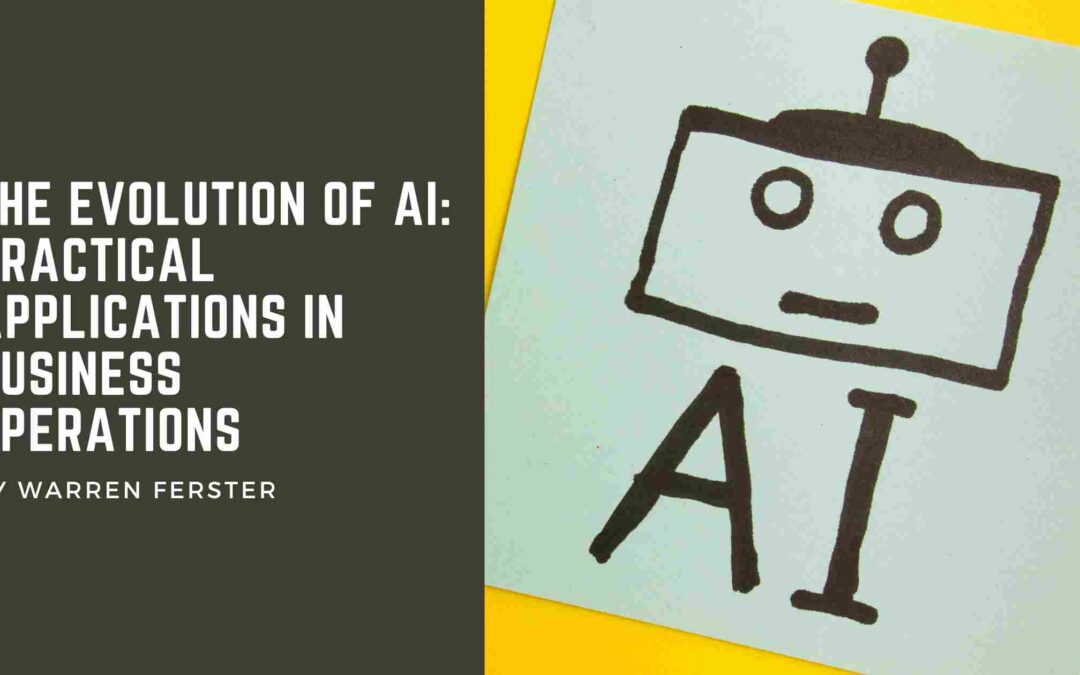Artificial Intelligence (AI) has transformed from a futuristic concept to an integral part of our daily lives and business operations. Its evolution has been marked by continuous advancements, driving innovation across various industries. In this article, we explore the journey of AI, its current state, and practical applications that are reshaping the landscape of business operations.
The evolution of AI has been nothing short of revolutionary, reshaping the way businesses operate and solve complex challenges. From its inception as a theoretical concept to its current practical applications, AI has become a driving force behind innovation and efficiency in business operations.
Early Foundations of AI
The roots of AI can be traced back to the mid-20th century when computer scientists and researchers began exploring the possibility of creating machines that could mimic human intelligence. The Dartmouth Conference in 1956 is often considered the starting point of AI as a formal discipline. Early AI systems focused on rule-based reasoning and symbolic approaches to problem-solving.
Machine Learning and Neural Networks
As computing power increased, so did the capabilities of AI. The introduction of machine learning, a subset of AI that enables systems to learn and improve from experience, marked a significant leap. Neural networks, inspired by the structure of the human brain, became a fundamental component of machine learning algorithms. This shift allowed AI systems to analyze vast amounts of data and recognize patterns, making them more adaptable and efficient.
Practical Applications in Business Operations
- Data Analysis and Insights: AI excels in processing and analyzing massive datasets. Businesses leverage AI-powered analytics tools to gain valuable insights into customer behavior, market trends, and operational efficiency. This data-driven approach aids in informed decision-making and strategic planning.
- Predictive Analytics: Predictive analytics, powered by AI algorithms, enables businesses to forecast future trends and outcomes based on historical data. From demand forecasting to identifying potential risks, predictive analytics enhances decision-making processes and reduces uncertainties in business operations.
- Customer Service and Chatbots: AI-driven chatbots have transformed customer service operations. These virtual assistants, equipped with natural language processing capabilities, provide instant responses to customer queries, streamline support processes, and enhance overall customer satisfaction.
- Supply Chain Optimization: AI plays a crucial role in optimizing supply chain operations. Predictive algorithms analyze variables such as demand, logistics, and inventory levels to streamline supply chain management, reduce costs, and improve overall efficiency.
- Process Automation: Robotic Process Automation (RPA) powered by AI has automated routine and rule-based tasks in business processes. This not only reduces manual workload but also minimizes errors, allowing employees to focus on more complex and strategic aspects of their roles.
- Personalized Marketing: AI-driven algorithms analyze customer preferences and behaviors to create personalized marketing strategies. From targeted advertisements to customized recommendations, businesses can enhance their marketing efforts, improving engagement and conversion rates.
- Fraud Detection and Cybersecurity: AI enhances cybersecurity by identifying unusual patterns and potential threats. In financial transactions, for instance, AI algorithms can detect anomalies and flag potential fraudulent activities, providing an additional layer of protection.
- Human Resources and Talent Acquisition: AI streamlines human resources functions, particularly in talent acquisition. Automated screening processes, chatbots for initial candidate interactions, and predictive analytics assist HR professionals in identifying the best-suited candidates efficiently.
- Healthcare Diagnostics: AI has made significant strides in healthcare, particularly in diagnostics. Image recognition algorithms assist in medical imaging analysis, helping healthcare professionals detect and diagnose conditions more accurately.
- Language Translation and Natural Language Processing: AI’s language capabilities have facilitated global communication. Natural Language Processing (NLP) enables accurate language translation, breaking down language barriers and fostering international collaboration in business operations.
Challenges and Ethical Considerations
While AI brings immense value to business operations, it also raises challenges and ethical considerations. Issues related to bias in AI algorithms, data privacy concerns, and the potential impact on employment require careful consideration and responsible AI implementation. Striking a balance between innovation and ethical use is crucial for the sustainable evolution of AI.
The evolution of AI from theoretical concepts to practical applications in business operations has been a transformative journey. Its impact is visible across industries, driving efficiency, innovation, and new possibilities. As businesses continue to adopt and adapt to AI technologies, the key lies in responsible implementation, ensuring that the benefits of AI are harnessed ethically and sustainably. The future promises further advancements, making AI an integral part of the ever-evolving landscape of business operations.

